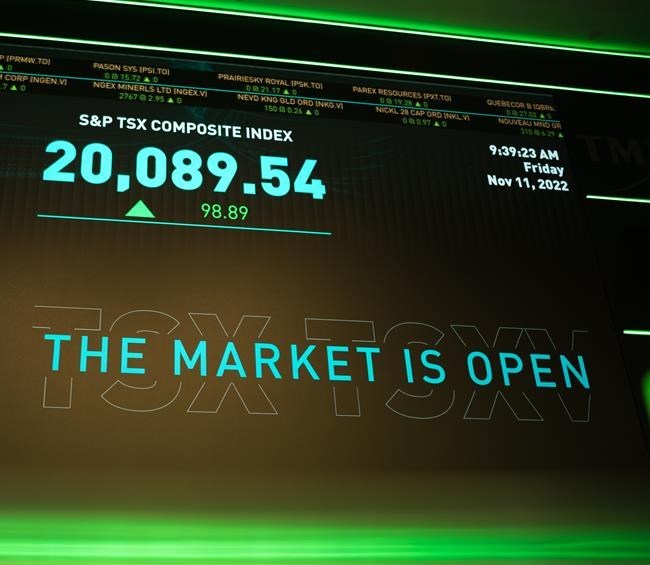TORONTO — Losses in energy on Canada's main stock index were offset by gains in other sectors, with the index posting a minor gain Wednesday, while U.S. markets were also up.
The S&P/TSX composite index was up 15.60 points at 20,720.39.
In New York, the Dow Jones industrial average was up 38.78 points at 34,128.05. The S&P 500 index was up 11.47 points at 4,147.60, while the Nasdaq composite was up 110.45 points at 12,070.59.
It’s all about U.S. data this week, said David Stonehouse, senior vice-president and head of North American and specialty investments at AGF Investments Inc., in an interview. Strong retail sales data Wednesday and Tuesday’s inflation numbers showing that inflation and the consumer are remaining resilient in the face of rising interest rates.
“We've seen the market start from a selling off position, and then kind of work its way back into neutral range as the day progressed, both yesterday and today,” he said.
Markets have been revising their expectations for the rate hiking cycle as a result, said Stonehouse.
“What we've seen the last few days is a continuation of the bond market selloff that's basically been in place ever since the employment data came out,” he said.
Equity markets have been more range-bound as of late, with fewer dramatic reactions to economic data, said Stonehouse.
While not long ago markets were pricing in up to two cuts to rates later in the year, now they’ve shaved that down to one in both Canada and the U.S., an expectation that could recede further, he said.
“In the last two weeks, a lot has been done to take rate cuts off the table and move the peak expectation more in line with the Fed.”
While a couple more hikes in the U.S. were already expected, now the possibility of one more hike in Canada this summer is also looking more likely, said Stonehouse.
The Canadian dollar traded for 74.57 cents US compared with 74.93 cents US on Tuesday.
After weakness in the fourth quarter of 2022, the U.S. dollar has recently been rallying, said Stonehouse, which could weigh on things like commodities if it continues. However, the Canadian dollar has so far held in relatively well, he said.
The March crude contract was down 47 cents at US$78.59 per barreland the March natural gas contract was down 10 cents at US$2.47 per mmBTU.
The April gold contract was down US$20.10 at US$1,845.30 an ounce and the March copper contract was down six cents at US$4.01 a pound.
This report by The Canadian Press was first published Feb. 15, 2023.
Companies in this story: (TSX:GSPTSE, TSX:CADUSD=X)
Rosa Saba, The Canadian Press



